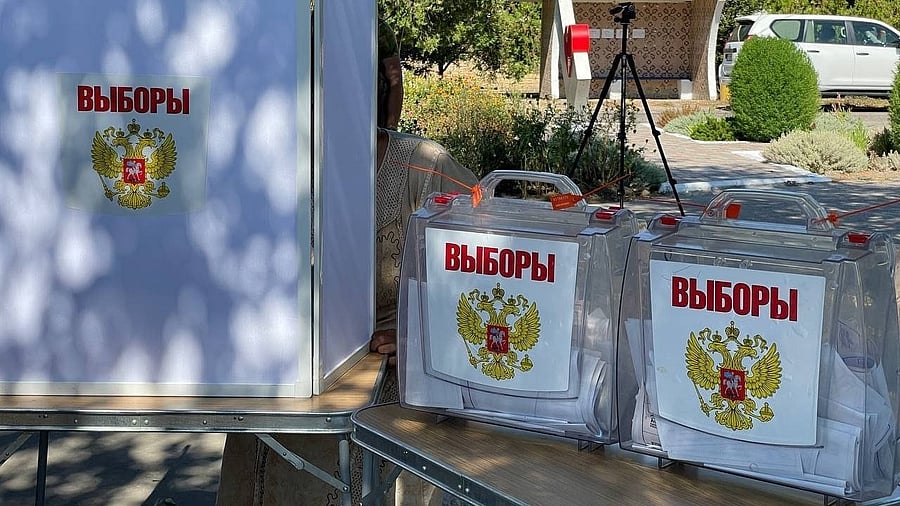
Ukraine local elections.
Credit: X/@MamedovGyunduz
Russian occupation officials are holding municipal and regional elections this week in four regions of Ukraine that Moscow has annexed, even as Ukrainian forces claw back territory in some of those areas in a grueling counteroffensive.
The voting is seen by Kyiv and its international allies as a fraudulent attempt by Moscow to tighten its grip on the territories it has illegally claimed in the south and east of Ukraine.
Voting began last week and runs until Sunday in the four partially occupied regions: Donetsk, Luhansk, Kherson and Zaporizhzhia. Together with Crimea, which Russia annexed in 2014, they make up about one-fifth of Ukrainian territory.
Early voting in some areas will end Thursday, while in other places voting will be held over the weekend, according to the Russian news agency Tass. Ukraine and its allies say the results are a foregone conclusion, and will lead to many Kremlin-connected candidates winning office.
Russia declared last year that it was annexing the four southern and eastern regions, but it has never fully brought them under Moscow’s control. Ukrainian forces are slowly regaining territory in the Zaporizhzhia region in a counteroffensive they began in June, and have also claimed advances around the occupied eastern city of Bakhmut, although the areas newly brought under Ukrainian control are mostly deserted.
The voting, which coincides with local elections across Russia, is ostensibly meant to elect parliamentary representatives for the four regions as well as for several Russian-occupied cities. Most of the candidates standing for election are connected to the Kremlin and are running virtually unopposed.
In a paper published this summer, Elina Beketova, a fellow at the Washington-based Center for European Policy Analysis, said the candidates include Artem Zhoga, the commander of a battalion that has fought with Russian proxy forces in eastern Ukraine, as well as Ukrainian collaborators who helped organize the Kremlin-orchestrated referendum that Russia used to help justify its annexation of Crimea. That referendum was considered illegal by the international community, which said the result had been inevitable.
Ivan Fedorov, the exiled Ukrainian mayor of Russian-occupied Melitopol and an unofficial spokesperson for the Ukrainian resistance in his city, said that many candidates in the Zaporizhzhia region were not residents and that some came from Russian regions as far away as Siberia. The elections, he said in a post on the Telegram messaging app, “are illegal and worthless.”
The Council of Europe, the continent’s main institution governing human rights, condemned the vote in a statement as “an illusion of democracy.”
Still, Russia has been promoting the vote, broadcasting images of local officials bringing mobile polling stations to communities near the front line.
But it remains unclear whether Ukrainian residents of Russian-occupied areas who have refused to get Russian citizenship will be allowed to vote. The Ukrainian authorities have urged people not to participate and have used drones to drop leaflets above some towns, calling on people to ignore the election.
In September, Russia organized referendums in the four regions that were widely condemned as illegal, in a prelude to Moscow’s declared annexation of the territories.
Beketova said the Kremlin had consistently followed a playbook it established in 2014 after its annexation of Crimea and partial occupation of territories in eastern Ukraine.
“A territory is first conquered, then the occupiers hold referendums to indicate the enthusiasm of the electorate, and then so-called elections,” Beketova wrote. “The main goal of the rigged votes is to legitimize the occupation of the territories as a steppingstone to integrating occupied land into the legal and political borders of Russia.”